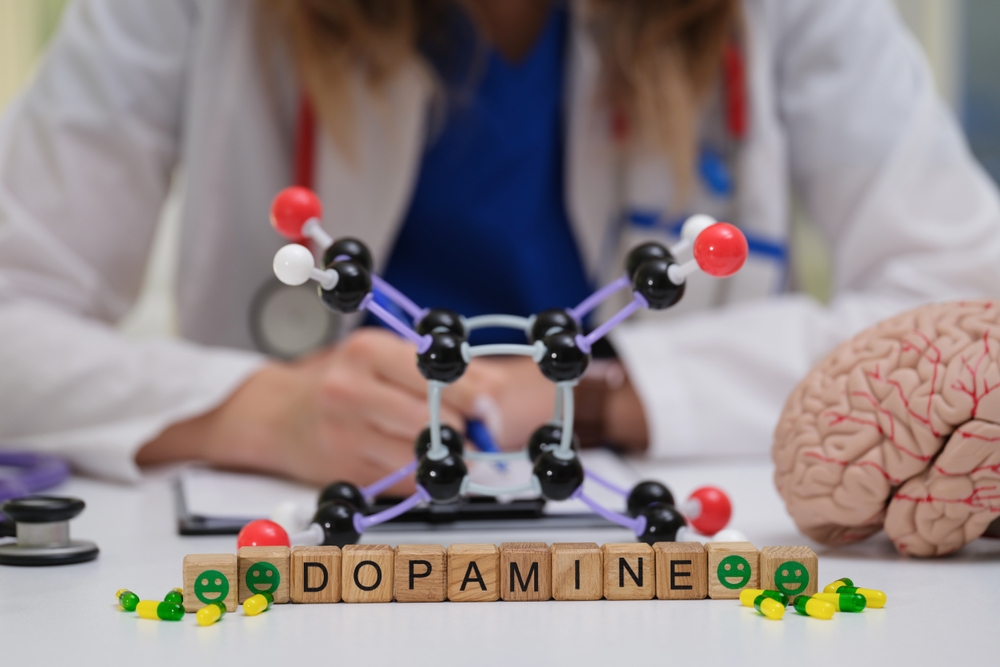You’ve probably seen the dopamine detox trend flooding social media, promising that if you just avoid all pleasurable activities for a few days, you’ll magically reset your brain’s reward system and become a productivity machine. The idea sounds scientific enough to be believable, but the reality is far more complicated than the wellness influencers want you to believe.
The concept behind dopamine detox suggests that modern life has flooded your brain with too much stimulation, leaving you unable to enjoy simple pleasures or focus on important tasks. Proponents claim that by temporarily eliminating music, social media, food enjoyment, and even conversations, you can somehow restore your brain’s natural dopamine sensitivity and achieve mental clarity.
But here’s the problem with this trendy brain hack, it’s based on a fundamental misunderstanding of how dopamine actually works in your brain. You can’t detox from a neurotransmitter that your brain produces naturally, and trying to eliminate all sources of pleasure might actually backfire in ways that leave you feeling worse than when you started.
Why dopamine isn’t the villain everyone thinks it is
Dopamine isn’t actually the pleasure chemical that popular culture makes it out to be. Instead, it’s more like your brain’s prediction and motivation system, helping you anticipate rewards and decide what’s worth pursuing. This neurotransmitter is constantly active in your brain, even during mundane activities like walking or thinking about what to eat for lunch.
The idea that you can become “addicted” to dopamine itself doesn’t make biological sense because your brain is always producing it as part of normal functioning. What people are really talking about when they mention dopamine addiction is the overstimulation of reward pathways by certain activities or substances, not an excess of the neurotransmitter itself.
Your dopamine system is incredibly sophisticated and doesn’t just flood your brain with feel-good chemicals every time something pleasant happens. Instead, it’s constantly calculating expectations versus reality, helping you learn from experiences and adjust your behavior based on outcomes. This system can’t be reset like a computer because it’s not actually broken in the first place.
The dopamine detox trend treats this complex neurotransmitter system like it’s a simple on-off switch that can be manipulated through deprivation. In reality, your brain’s reward circuitry is more like a symphony orchestra where different instruments play different roles, and you can’t improve the music by forcing half the musicians to stop playing.
What happens when you try to eliminate all pleasure
When dopamine detox enthusiasts recommend avoiding all enjoyable activities, they’re essentially asking you to fight against millions of years of evolution that programmed your brain to seek out rewards necessary for survival. This approach often backfires because deprivation can actually increase cravings and make you more likely to overindulge later.
Extreme restriction of pleasurable activities can trigger your brain’s stress response systems, flooding your body with cortisol and other stress hormones that can actually impair cognitive function and mood regulation. Instead of achieving mental clarity, you might find yourself feeling anxious, irritable, and unable to concentrate on the very tasks you were hoping to improve.
The social isolation component of many dopamine detox protocols can be particularly harmful because human connection is fundamental to mental health and brain function. Cutting yourself off from meaningful interactions doesn’t reset your reward system, it deprives your brain of essential social stimulation that supports emotional regulation and cognitive performance.
Many people who attempt strict dopamine detoxes report feeling depressed, unmotivated, and mentally foggy during the restriction period. These aren’t signs that the detox is working, they’re symptoms of depriving your brain of the varied stimulation it needs to function optimally.
The real problem isn’t too much dopamine
What people attribute to dopamine dysfunction is often actually about the quality and timing of rewards rather than the quantity of dopamine in their brains. Modern technology and lifestyle can create patterns of instant gratification that interfere with your ability to pursue longer-term goals, but this isn’t because your dopamine system is broken.
The issue isn’t that you’re getting too much pleasure from things like social media or video games, but rather that these activities provide immediate, predictable rewards that can crowd out your motivation to pursue more challenging but ultimately more satisfying goals. It’s a scheduling problem, not a chemical imbalance.
Your brain’s reward system evolved to help you survive in an environment where resources were scarce and rewards were unpredictable. Modern life presents constant opportunities for immediate gratification that can hijack this ancient system, but the solution isn’t to eliminate all pleasure, it’s to create better reward timing and variety.
The real culprit behind what people call dopamine dysfunction is often lifestyle factors like poor sleep, lack of physical activity, social isolation, or chronic stress. These issues affect how your brain processes rewards and motivation, but they can’t be fixed by temporarily avoiding enjoyable activities.
Why the detox mentality misses the point
The detox mindset assumes that pleasure is inherently problematic and that deprivation is inherently virtuous, but this black-and-white thinking ignores the nuanced role that enjoyment plays in mental health and motivation. Pleasure isn’t the enemy of productivity, it’s often the fuel that powers sustained effort toward meaningful goals.
Treating your brain’s reward system like it needs to be purged or cleansed suggests that there’s something wrong with experiencing joy, satisfaction, or excitement. This approach can actually create an unhealthy relationship with pleasure where you feel guilty about enjoying things that are perfectly normal and beneficial.
The temporary nature of most dopamine detoxes means that any benefits people experience are likely due to the placebo effect or the natural motivation boost that comes from making any intentional change to your routine. These short-term improvements rarely translate into lasting behavioral changes because they don’t address the underlying patterns that created problems in the first place.
Detox thinking also ignores individual differences in brain chemistry, personality, and life circumstances. What works for one person’s reward system might be completely inappropriate for someone else, and blanket recommendations for eliminating entire categories of activities don’t account for these important variations.
The hidden dangers of pleasure deprivation
Extended periods of avoiding enjoyable activities can actually sensitize your brain to rewards in ways that make you more likely to develop problematic relationships with the very things you were trying to avoid. When you finally allow yourself to engage with previously forbidden activities, the contrast can create an intense rebound effect.
Dopamine detox protocols often inadvertently promote an all-or-nothing mentality that can contribute to cycles of restriction and overconsumption. This pattern is similar to what happens with extreme dieting, where periods of deprivation are followed by episodes of uncontrolled indulgence.
The social media posts celebrating dopamine detox achievements can actually become their own form of reward-seeking behavior, where people pursue the validation and attention that comes from publicly demonstrating their willpower. This defeats the supposed purpose of reducing stimulation-seeking behaviors.
Some people use dopamine detox as a way to avoid dealing with underlying mental health issues like depression, anxiety, or ADHD. While temporary lifestyle changes might provide short-term relief, they can delay proper treatment for conditions that would benefit from professional intervention.
What actually helps optimize your reward system
Instead of trying to eliminate dopamine or avoid all pleasure, focus on creating a more balanced and varied reward portfolio in your life. This means intentionally including both immediate small pleasures and longer-term satisfying goals that provide different types of motivation and fulfillment.
Regular physical exercise is one of the most effective ways to naturally optimize your dopamine function because it provides both immediate mood benefits and longer-term improvements in brain chemistry. Exercise doesn’t overstimulate your reward system, it actually helps regulate it more effectively.
Improving sleep quality has profound effects on dopamine regulation and reward processing. Poor sleep disrupts the normal cycles of neurotransmitter production and can make you more susceptible to craving immediate gratification while reducing your motivation for longer-term goals.
Mindfulness practices can help you become more aware of your reward-seeking patterns without judgment, allowing you to make more conscious choices about how you spend your time and energy. This awareness-based approach is more sustainable than restriction-based methods.
Building sustainable reward balance
The goal isn’t to eliminate sources of pleasure but to create a lifestyle where immediate rewards complement rather than compete with longer-term satisfaction. This might mean scheduling specific times for social media or entertainment while also protecting time for activities that provide deeper fulfillment.
Learning to tolerate some degree of boredom and discomfort can help you develop better impulse control without requiring extreme deprivation. This tolerance can be built gradually through practices like meditation, delayed gratification exercises, or simply spending time without constant stimulation.
Creating meaningful social connections and pursuing activities that align with your values provides natural dopamine regulation that doesn’t require artificial restriction. When your life includes genuinely satisfying experiences, you’re less likely to overrely on quick fixes for mood regulation.
Addressing underlying stress, sleep problems, or mental health issues often resolves many of the symptoms that people attribute to dopamine dysfunction. These foundational health factors have more impact on reward processing than temporary lifestyle restrictions.
The balanced approach to brain optimization
Your brain’s reward system doesn’t need to be detoxed, it needs to be understood and worked with rather than against. The most effective approaches to optimizing motivation and focus involve lifestyle changes that support overall brain health rather than extreme restrictions that fight against normal neurological functioning.
Real improvement in focus, motivation, and life satisfaction comes from creating sustainable patterns that honor both your need for immediate pleasure and your desire for longer-term meaning. This balanced approach takes more effort than a quick detox, but it produces lasting changes that actually improve your quality of life.
The next time someone suggests that you need to detox from dopamine, remember that your brain is already perfectly equipped to regulate its own reward systems when given the right support through good sleep, regular exercise, meaningful relationships, and manageable stress levels.
Your brain doesn’t need a detox, it needs balance
The dopamine detox trend appeals to people because it promises a quick fix for complex problems related to motivation, focus, and life satisfaction. But like most quick fixes, it misses the deeper issues and can actually make things worse by creating an adversarial relationship with pleasure and reward.
Your dopamine system isn’t broken, it’s responding normally to an environment that provides certain types of stimulation in abundance while lacking others. The solution isn’t deprivation, it’s creating a more balanced and intentional approach to how you structure rewards and challenges in your daily life.
Instead of trying to reset your brain through extreme measures, focus on building sustainable habits that support your natural reward systems while helping you pursue the goals and experiences that truly matter to you. Your brain will thank you for working with it rather than against it.















